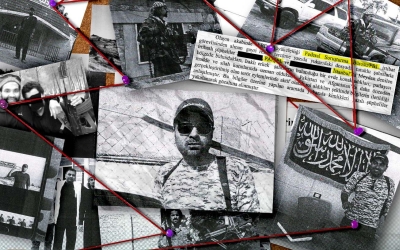FBI informant who infiltrated Islamic State and al-Qaeda released from US prison

An FBI informant who infiltrated al-Qaeda and Islamic State-linked networks in Syria and Turkey has been released from prison in Florida after serving a reduced sentence for threatening his handlers.
Kamran Faridi, whose work for the FBI included renting an Istanbul safehouse where alleged IS suspects were arrested in a high-profile Turkish police raid in 2015, was freed last month after more than four years in prison.
Faridi, who is 52 and from Pakistan, was jailed in 2021 for seven years after a trial which took place largely in secret. Earlier this year, his sentence was reduced to 72 months.
Faridi told MEE he had been released on probation and is now expected to leave the US within months under a voluntary departure agreement that formed part of a plea deal struck after prosecutors had originally called for him to be jailed for 30 years.
“They gave me six months to put my affairs in order,” he said.
Stay informed with MEE's newsletters
Sign up to get the latest alerts, insights and analysis, starting with Turkey Unpacked
Other terms of the deal included a commitment by Faridi not to talk to anyone associated with terrorist groups and an understanding that he would not work for any other intelligence or security agencies in the future.
He told MEE he had been dismissed by the FBI, and then arrested and imprisoned over death threats in phone messages to former colleagues, after he had threatened to reveal details of an alleged entrapment operation targeting a Pakistani businessman.
'I was about to disclose their [FBI's] dirty laundry. They had to save their own'
- Kamran Faridi
He said he felt let down by how he had been treated by the FBI and the US government and said he “could have died several times” in his work infiltrating militant groups and organised crime gangs.
“I didn’t want an award, but I didn’t want to be in jail either. I would have given my life with a big smile because I thought I was making the world a better place,” he said.
Faridi said he had been left with no money and nowhere to go but Pakistan, and was fearful for his safety if he had to return to his native country.
“For everybody who I ever fucked, I am a walking target right now,” he said. “So they are going to go after me and it is what it is.”
Trafficking heroin
Faridi, who grew up in Karachi, migrated to the US in the early 1990s and was recruited by the FBI as a full-time informant in 1996 after infiltrating an Urdu-speaking crime gang in Atlanta.
In 2001, following al-Qaeda’s 9/11 attacks, he joined the FBI's Joint Terrorism Task Force in New York and travelled the world infiltrating al-Qaeda networks in southeast Asia, the Middle East, Africa and South America.
Faridi told MEE he had also worked for other western intelligence services, including the UK’s MI6.
'At the end of the day, I am a Pakistani third-class citizen from a third world country. They threw me away'
- Kamran Faridi
But his FBI career appears to have ended abruptly in early 2020 following disagreements with his handlers about an operation targeting Jabir Motiwala, a Karachi businessman who was then held in the UK on a US arrest warrant accusing him of links to a South Asian crime gang.
Legal documents relating to Motiwala’s extradition hearings in the UK obtained by MEE revealed that FBI informants were involved in trafficking shipments of heroin from Karachi to the US as part of an alleged plot to frame Motiwala.
Faridi confirmed he was one of those informants. He told MEE he had also been ordered to fabricate evidence against Motiwala but had refused to do so.
Shortly after being dismissed by the FBI, Faridi flew to London where he intended to give evidence at Motiwala's extradition hearing at the High Court.
But Faridi was detained on arrival in the UK, sent back to the US and arrested on charges relating to the messages he had sent to his handlers.
Motiwala’s lawyers nonetheless presented a statement by Faridi to the court. They complained that he had been prevented from giving evidence in “bizarre circumstances” that amounted to “an abuse of the court process as a form of prosecutorial misconduct”.
Shortly afterwards the US Department for Justice dropped its case against Motiwala. He was released and awarded compensation by the UK government after it conceded his 32-month detention had been unlawful.
Istanbul raid
MEE revealed extraordinary details of Faridi’s work infiltrating militant groups in 2022 after obtaining Turkish court documents relating to an investigation into six men accused of being members of IS who were arrested at a seafront villa in Istanbul’s Silivri suburb in November 2015.
Faridi, who rented the villa, had left Turkey a few days before the raid. It was later revealed in court that the raid was based on information about an alleged plot to attack Istanbul provided to Turkish authorities by an FBI liaison officer.
But Turkish prosecutors eventually admitted they had found no evidence of any such plot. Three of the men were eventually convicted of being members of IS, while the other three were released.
The three men convicted in the case included a British man, Aine Davis, who had been linked in the media to a notorious IS execution cell nicknamed “the Beatles”.
Davis denied being a member of IS and any association with the other men accused of being members of the Beatles.
He said he had travelled to opposition-held Syria to do aid work, and said he believed his association with Mohammed Emwazi, the ringleader of the cell nicknamed “Jihadi John”, was based on the fact that the men had attended the same mosque in London.
At the time of his arrest Davis was the subject of an Interpol red notice, and he said he had travelled to the villa in Istanbul to acquire a fake passport.
Davis was released from prison in Turkey in August 2022 and immediately deported to the UK where he was arrested on his arrival. Last November, he was jailed for eight years after pleading guilty to two charges of funding terrorism dating from 2013 and 2014 and one charge of possessing a firearm.
Court documents obtained by MEE revealed further details about Faridi’s work infiltrating militant circles in Syria during the country’s civil war.
Lawyers representing the defendants in the trial alleged that “American or British intelligence” had told Turkish authorities Faridi was linked to Jabhat al-Nusra, an al-Qaeda-affiliated Syrian militant group which later evolved into Hay’at Tahrir al-Sham (HTS) and continues to control much of Idlib province in northwestern Syria.
A number of photos obtained from mobile phones and laptops seized as evidence in the case showed Faridi in Nusra-controlled areas of Syria in 2015.
One showed him raising his finger at a road junction on the M4 highway outside the town of Saraqeb. Another showed him outside a restaurant in Idlib City which MEE’s sources said was a known meeting place for foreign fighters and militant leaders associated with Nusra and other hardline groups.
'Dirty laundry'
In arguing for a reduction in the length of his sentence, Faridi’s lawyers argued that he had not intended to act on the threatening messages he sent to his FBI handlers following his dismissal, and suggested that the recipients of his messages had also not regarded them as credible because of the nature of their work.
“These are not individuals who live a soft life – they are serious, foul-mouthed, and deal with unspeakable levels of violence on a near daily basis. The vernacular they use among themselves reflects this reality,” they said in a legal argument presented at a hearing earlier this year.
Faridi told MEE: "I'm a street guy. I'm not a boy scout. I talk like a truck driver. When they told me they were charging me [over the messages] I laughed, I thought they were joking."
He believes he was arrested and jailed not because of the messages he had sent to his handlers but because he had threatened to reveal details of FBI investigative methods that the bureau did not want to be publicised.
“I was about to disclose their dirty laundry. They had to save their own,” he said.
“At the end of the day, I am a Pakistani third-class citizen from a third world country. They threw me away.”
An FBI spokesperson told MEE: “We have no comment.”
Middle East Eye delivers independent and unrivalled coverage and analysis of the Middle East, North Africa and beyond. To learn more about republishing this content and the associated fees, please fill out this form. More about MEE can be found here.






